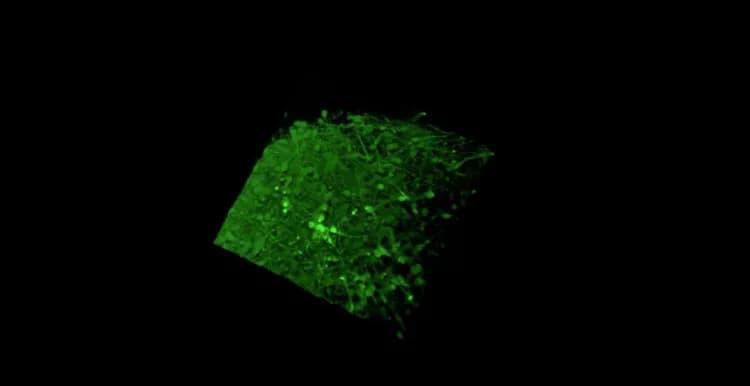
Lab-Created Mini-Brains Reveal How Growing Organ Maintains Neuronal Balance
Scientists can now explore in a laboratory dish how the human brain develops by creating organoids -- distinct, three-dimensional regions of the brain. In research published in Cell Stem Cell, Yale scientists coaxed early stage stem cells to create and fuse two types of organoids from different brain regions to show how the developing brain maintains proper balance of excitatory and inhibitory neurons.
A failure to maintain this balance has been implicated in a host of neurodevelopmental disorders such as autism and schizophrenia.
"The inhibitory neurons migrate from specific areas of the embryonic brain to the region where excitatory neurons are being produced," said senior author In-Hyun Park, associate professor of genetics and associate professor in the Child Study Center. "What we did is to fuse these two areas and watched the process unfold."
The Yale team used human pluripotent stem cells to grow an organoid called the human medial ganglionic eminence, which produces inhibitory neurons and plays a crucial but brief role in early development of the cortex. By merging this structure with another that produces excitatory neurons they could track migration of the inhibitory cells, which provide a crucial check on excitatory neurons.
Understanding the process will not only help researchers understand how the human brain evolved, but shed light on how imbalances contribute to many neurodevelopmental disorders.
For instance, excess activity by excitatory neurons has been implicated in schizophrenia while too much inhibitory neuronal activity may contribute to depression, Park said. The imbalance has also been linked to development of autism spectrum disorders he said.
Materials provided by Yale University. Original written by Bill Hathaway. Note: Content may be edited for style and length.
Disclaimer: DoveMed is not responsible for the accuracy of the adapted version of news releases posted to DoveMed by contributing universities and institutions.
Primary Resource:
Yangfei Xiang, Yoshiaki Tanaka, Benjamin Patterson, Young-Jin Kang, Gubbi Govindaiah, Naomi Roselaar, Bilal Cakir, Kun-Yong Kim, Adam P. Lombroso, Sung-Min Hwang, Mei Zhong, Edouard G. Stanley, Andrew G. Elefanty, Janice R. Naegele, Sang-Hun Lee, Sherman M. Weissman, In-Hyun Park. (2017). Fusion of Regionally Specified hPSC-Derived Organoids Models Human Brain Development and Interneuron Migration. Cell Stem Cell. DOI: 10.1016/j.stem.2017.07.007
Related Articles
Test Your Knowledge
Asked by users
Related Centers
Related Specialties
Related Physicians
Related Procedures
Related Resources
Join DoveHubs
and connect with fellow professionals

0 Comments
Please log in to post a comment.